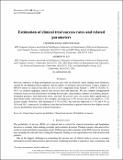Estimation of clinical trial success rates and related parameters
Author(s)
Wong, Chi Heem; Siah, Kien Wei; Lo, Andrew W
Downloadkxx069.pdf (472.7Kb)
Terms of use
Metadata
Show full item recordAbstract
Previous estimates of drug development success rates rely on relatively small samples from databases curated by the pharmaceutical industry and are subject to potential selection biases. Using a sample of 406 038 entries of clinical trial data for over 21 143 compounds from January 1, 2000 to October 31, 2015, we estimate aggregate clinical trial success rates and durations. We also compute disaggregated estimates across several trial features including disease type, clinical phase, industry or academic sponsor, biomarker presence, lead indication status, and time. In several cases, our results differ significantly in detail from widely cited statistics. For example, oncology has a 3.4% success rate in our sample vs. 5.1% in prior studies. However, after declining to 1.7% in 2012, this rate has improved to 2.5% and 8.3% in 2014 and 2015, respectively. In addition, trials that use biomarkers in patient-selection have higher overall success probabilities than trials without biomarkers.
Date issued
2018-01Department
Massachusetts Institute of Technology. Computer Science and Artificial Intelligence Laboratory; Massachusetts Institute of Technology. Department of Electrical Engineering and Computer Science; Sloan School of ManagementJournal
Biostatistics
Publisher
Oxford University Press (OUP)
Citation
Wong, Chi Heem et al. “Estimation of Clinical Trial Success Rates and Related Parameters.” Biostatistics 20, 2 (January 2018): 273–286 © 2018 Oxford University Press
Version: Final published version
ISSN
1465-4644
1468-4357
Collections
The following license files are associated with this item: